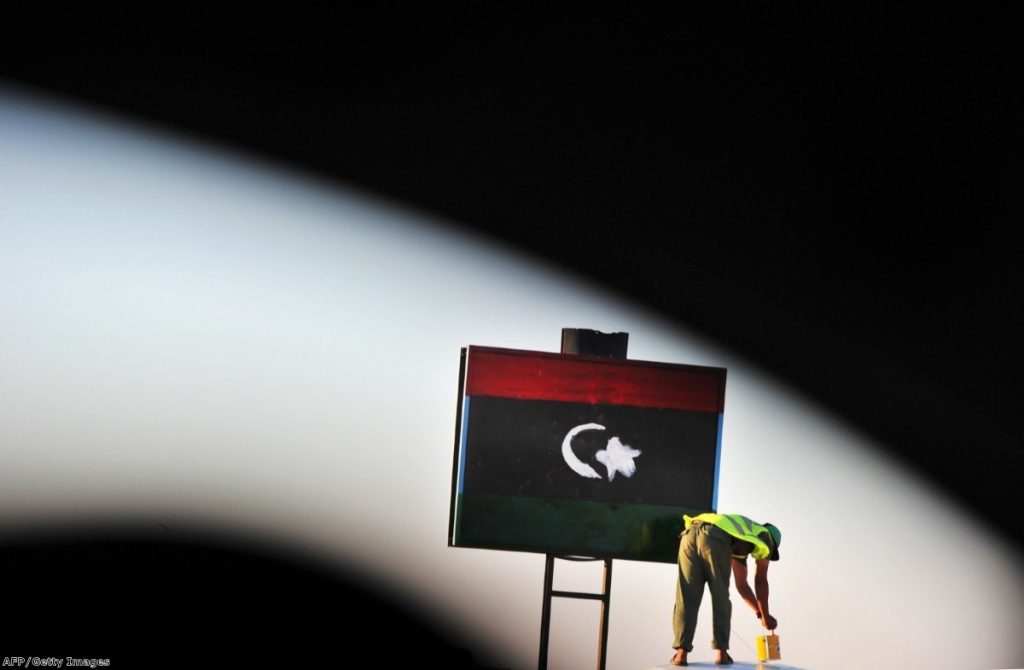Fierce fighting in Tripoli as rebels claim to corner Gaddafi
By Ian Dunt Follow @IanDunt
There was fierce fighting in Tripoli today, after a thousand rebels gathered around a building where they believe Colonel Gaddafi is hiding.
There is no independent confirmation of the rumours, but opening shots from rebel forces were met by a volley of return fire from what are believed to be Gaddafi loyalists.
"They are together. They are in a small hole," one of the fighters, Muhammad Gomaa, told Reuters.
"Today we finish. Today we will end that."
The standoff took place as a new audio statement from the dictator emerged, with Gaddafi calling on is followers to "destroy" the rebels.
Moussa Ibrahim, Gaddafi's spokesman, said he was "leading the battle for our freedom and independence".
The development came as the Liam Fox and William Hague warned British military operations in the country were far from over.
"I don’t think that we should in any way consider our mission as being over. There was increased Nato activity last night including British fast jets," Mr Fox, defence secretary, told Sky News.
The foreign secretary added: "It is not over. The regime is finished, but fighting in Libya, as everybody can see from their television screens, is not over yet."
Rebel forces are becoming increasingly desperate to find Colonel Gaddafi so he can be prevented from acting as a figurehead for those elements still loyal to the regime.
Yesterday, rebel spokesman Mustafa Abdul Jalil effectively put a price on the dictator's head, saying any member of his entourage who killed or captured him would receive an amnesty for any crimes they have committed.
The Telegraph reported this morning that British soldiers from the 22 SAS Regiment were helping rebels track him down.
The longer the current bout of street fighting goes on the more fears there are about the discipline of rebel fighters, who have already started looting and firing upon civilian houses according to some reports.
Widespread rumours that the Gaddafi armed many of the civilians in pro-regime areas of Tripoli have contributed to fears that the fighting is not restricted just to soldiers.
The Gaddafi compound at Bab al-Aziziya, which was euphorically taken over by rebels on Tuesday, came under heavy fire yesterday from the pro-regime area of Abu Salim.
The woods around the city zoo are said to be covered in snipers while a building in the area once used by Gaddafi's son, Saif al-Islam, was draped in a green flag symbolising the old regime.
Many rebels say the remaining Gaddafi loyalists are predominantly Arab and African mercenaries.
Outside the capital, the Gaddafi stronghold of Sirte, where he was born, was facing a major rebel advance following the firing of scud missiles towards the rebel-controlled Misrata.
That scud attack is being variously interpreted as the initial salvo in a 'stay-behind' strategy modelled on that employed by Saddam Hussein's forces after the fall of Baghdad in 2003 or just a desperate last stand.
The rebel's nightmare scenario is that Gaddafi managed to get out of Tripoli and into Sirte, where old tribal loyalties could make it an implacable outpost of pro-regime militancy.
Much of the rebel's ability to keep the population onside will depend on how quickly they can get much-needed utilities online – a complete reversal of their campaign strategy, which tried to cut the capital off from the rest of the country.
The prospect of a quick turnaround was complicated when South Africa stalled US efforts to unfreeze $1.5 billion (£610 million) of Libyan assets through the UN security council on the basis that it still had not formally recognised the National Transitional Council (NTC).
"It’s very clear what side the Libyan government is on and I think that’s what the South African government should respond to," Mr Fox said angrily this morning.
The country seemingly changed its mind overnight however and decided to back the US plan.
Following a conversation between David Cameron and South African president Jacob Zuma, a Downing Street spokesman said: "They agreed that Libya now has the opportunity for transition to a peaceful, democratic and inclusive government and they discussed how the international community should actively and urgently support this process."
Diplomatically, things continued to move in the rebels' direction, however.
Across the world, a wave of Libyan embassies switched sides, replacing the green Gaddafi flag with the tricolour used by the rebels.
Meanwhile, two senior members of the Gaddafi government switched to the rebel side.
Deputy director of foreign security in the Libyan intelligence service, General Khalifah Mohammed Ali, and health minister Mohammed Hijazi declared their new allegiance on al-Arabiya TV.





-01.png)